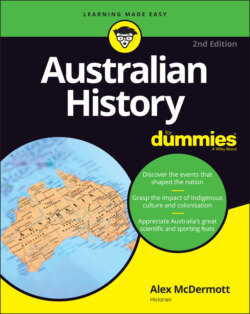Читать книгу Australian History For Dummies - Alex McDermott - Страница 51
CONNECTING A FEAR OF POWERFUL KINGS TO BOTANY BAY
ОглавлениеIt’s a slightly roundabout way to get to Botany Bay, but real connections can be drawn between the political revolutions against the central state and the powerful kings of the 16th century in England, and the institution of transportation. And these connections produce a lot of the momentum to start a colony on the other side of the world in a just-discovered-by-us-practically-yesterday continent.
In what sort of country does shipping your convicted criminals off to the other side of a huge ocean seem like a good idea? In 18th-century Britain is the answer, and here’s why.
Britain was unique in 18th century Europe because it was a country governed essentially without police, and without a large army constantly ready to put down rebellions and keep order. One quirk of this system (or lack of system) was the form of punishment developed to deal with all the crime — transportation.
In the 17th and 18th centuries, most countries in Europe had established strong central states with plenty of power. (We could call these states ‘draconian’ if we were feeling impolite.) Kings, princes and assorted monarchs had established their right to rule as something absolute, ordained by God. In Europe, before the French Revolution, the ‘Divine Right of Kings’, or of ‘Absolute Monarchs’, was still a definite thing.
Figuring this sounded like a pretty good way of running things (and, if you’re a king, I can definitely see the appeal), English kings had tried this out themselves in the 17th century, only to run into troubles with a deeply annoyed populace and a stroppy institution called ‘parliament’. Two civil wars aimed to settle the point, and the English king in question lost both times. In 1648 he lost his head as well, and in 1688 one of his sons to exile.
One effect of this was that the victors in this tug of war became seriously paranoid about giving the central state (and the monarch who happened to be attached to it at the time) extensive powers. The rich and powerful feared the prospect of a king with a powerful army or an effective police force that could be used against them, so they severely constrained the reach of the central state, bound the monarch in ‘constitutional limits’, and pretty much did away with any police force.
What happens when you do away with a police force?
Well, in this particular time and place, the answer is you get a truckload of crime. No police or military force could be called out for assistance. The rich continued to hold the reins of power, but it wasn’t easy to keep order. Pretty much the only option they had to hand was making the punishment for crimes committed by any criminals they did manage to catch completely over the top (‘draconian’ again comes to mind).
From the early 18th century, a whole new series of laws were passed by the wealthy Members of parliament, which punished lots of ordinary crimes with either the death penalty or, you guessed it, transportation.
